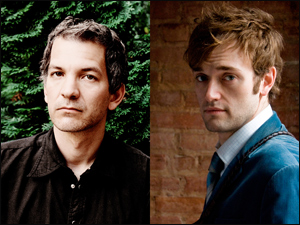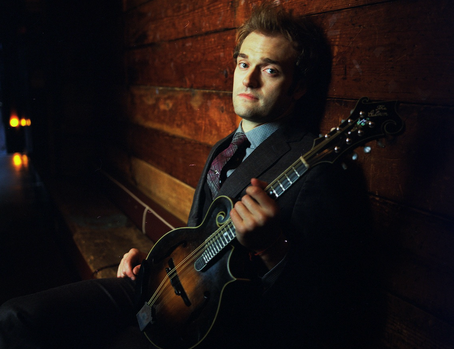Jazz Review: Chris Thile and Brad Mehldau At The Berklee Performance Center
The wizards of mandolin and jazz piano were in perfect sync, blending styles and breaking barriers.
By Steve Mossberg
Mandolin and jazz piano are strange bedfellows, but they were shockingly well paired in the hands of Chris Thile and Brad Mehldau at their Crash Arts/World Music concert at the Berklee Performance Center Sunday night. Mehldau, the wiry, intellectual pianist who once shook up a conservative jazz scene with Radiohead covers and classical song cycles, played in his usual Zen state—eyes closed, head cocked to the side. Thile, the scrappy, quipping rock star of the mandolin threw rock and roll riffs around and about the Steinway. The combined sound was inspiring—they infused their personal sensibilities into a wide range of music.
When Mehldau first came onto the scene in the mid-nineties, his first major contribution to jazz piano was to liberate the instrument from typical styles of accompaniment. Like predecessors Keith Jarrett and Chick Corea, he possessed convincing concert-pianist abilities from the start, but he was the first to really succeed in freeing the left hand from a claw-like comping or stride technique. The result was a considerable increase in the sonic range of the piano and the consequent illusion of three or four hands on the keyboard at once. It’s not a stretch to say that Mehldau is a pianist best appreciated without a rhythm section, and thanks to Thile’s sensitive duet playing, the whole agile package was on display.
At the same time that Mehldau was changing jazz, the teenage Thile, then a member of the young bluegrass group Nickel Creek, was developing his own novel techniques. Related more closely to the violin than the guitar, the mandolin has never been much of a chordal instrument beyond the chopped bluegrass chords of Bill Monroe and his school. Thile’s playing is marked by sophisticated harmonic work; his solo lines soar across every inch of his fretboard, making the very small instrument sound very big and versatile. Alongside Mehldau’s piano, he was able to fill the roles of a jazz guitarist, rock drummer, and string quartet.
What at first sounded like an instrumental jam turned quickly into a simmering rendition of folk singer Gillian Welch’s “Scarlet Town.” Thile’s vocals, which are astoundingly good for a virtuoso instrumentalist, were highly emotional, and Mehldau himself added some half-spoken, low harmonies. The duo could have continued on with jazzed up folk singing for the rest of the night, but they seldom stayed in any one mode for very long. Next, they jumped into an instrumental tune, newly composed by the pianist. It was a strong showing for the polystylist on the keys, combining train-in-the-distance rhythmic figures with disjunct, indie-rock chord changes, and Thile was nimble in navigating them in his improvisations.
The ability of the duo to switch textures quickly, arranging on the fly, served them well on a cover of Fiona Apple’s “On the Bound,” where they managed to pull some austere, Russian classical figures out of the minor harmonies. It also allowed them forgo the dry tradition of trading choruses of solo and accompaniment, readily jumping into the improvisation process, trading lines and imitating each other in counterpoint. In fact, every song they played felt fresh and organic in this way.
A highlight of the concert was the duo’s ability to play with as well as experiment within musical traditions while still maintaining their integrity. At no point in the evening was this better displayed than in a medley of one of the more difficult fiddle tunes in the repertoire, “St. Anne’s Reel,” and one of the most challenging bebop numbers, “Dexterity.” The reel was played with real care and erudition, and the two elaborated more beautifully on the melody each time it came around until it took on an entirely new character and meaning. “Dexterity” sounded relaxed but intense, as Thile reconciled the ceaseless pace of a bluegrass soloist with the probing invention of Charlie Parker or Dexter Gordon. Mehldau couldn’t have been further from cliché as he supported the mandolinist with the rich chord changes or when he himself soloed using romantic chorale lines instead of flying jazz riffs. Later in the evening, he managed to slide gospel accompaniment under a sweet, Celtic waltz.
Thile had two original songs in the concert: the first was his old Punch Brothers’ tune “Me and Us,” and the second was a newly minted, mid-tempo rocker called “Chopped Down Your Shade Tree.” The former was expertly arranged for the evening’s reduced instrumental forces and although sophisticated and highly dramatic, flowed cleanly and transparently. The latter tune was perhaps the only moment during the evening where it felt like something wasn’t clicking on stage—perhaps the jazzy melody sounded a bit self-conscious against the post-Radiohead chords the two were plunking out. Ironically, a wordless cover of Radiohead’s own “Knives Out” earlier in the evening was flawless.
The show closed down with a good-humored rendition of Bob Dylan’s “Don’t Think Twice, It’s All Right.” Thile was very much the charismatic troubadour, using his vocal flexibility to make the lyrics all his own. In between verses, he and Mehldau alternated solo passages, and the pianist revealed startling stylistic connections among folk, bluegrass, and old-time jazz, extending his chameleonic approach with each successive chorus.
It was all screams and standing ovations at the Berklee Performance Center, and when the pair came out for their encore, Thile cheekily asked if there happened to be “any musicians in the audience tonight.” Perhaps as a nod to their jazzy environs, they opted for a sweet and simple reading of the old Green/Heyman standard “I Cover The Waterfront.” Mehldau played in a warm Bill Evans mode while the singer, generally leaving his instrument aside, strongly channeled the quiet crooning of Chet Baker.
Even for accomplished genre-trotters like Thile and Mehldau, the task of unifying such disparate music in one performance poses a considerable challenge. What’s really important, however, was not that they were able to mix-and-match so consistently but that they sounded so personal and natural in doing so. To hear the musicians pull that off with integrity is a special thing.



